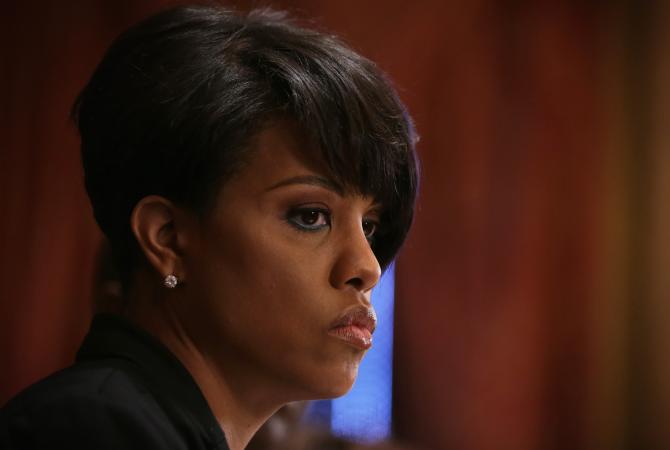
Baltimore may be a much calmer city this week than last, but don’t let the placid fog of cleanup and obligatory Loretta Lynch visit fool you. Long stretches of ghetto still remain. The lack of jobs is something Charm City’s leadership has yet to aggressively address (Where’s the campaign on that?). And Maryland’s shattered urban jewel is still the “toughest place” in the country for poor kids to shake poverty, according to a recent study.
The most significant change in Baltimore, however, will be the political riptide passing through the city, the state and the rest of the nation. Ironically, Baltimore happened just as a wave of presidential hopefuls jumped into the 2016 cycle; and next year will find the city wrapped up in a mayor’s race while observers watch a grimy battle over Maryland’s open U.S. Senate seat (that could present some surprising plot twists). Because the unrest occurred in a major Northeast Corridor city and just 30 minutes from the nation’s capital, poverty issues now dominate pre-election narratives in ways that Ferguson, Mo., did not.
As the American public continues grappling with what the death of Freddie Gray and its aftermath means long term, here are five political signs that just made it a crucial, and possibly decisive, issue in 2016:
Poverty is finally a talking point. When the issue of poverty comes up, politicians are more likely to fake it. They talk about opportunity, but rarely touch the word “poor,” settling for the safer “middle class” instead. In addition, Democrats are visibly nervous that too much poverty discourse could sour the Obama administration “recovery” theme and ruin their electoral hopes in 2016.
Now, after watching West Baltimore boil while troops moved in, few can ignore it. It remains to be seen if the unrest spills over to the presidential prospects of former Baltimore Mayor and Maryland Gov. Martin O’Malley, who was viewed for a moment as the best antidote Clinton-frustrated progressives could muster. Still, candidates and politicians—even Republicans—are jumping headfirst into the subject, each attempting to offer his or her own fresh take or approach.
Hillary Clinton, avoiding a repeat of her wait-and-see-on-Ferguson mistake, couldn’t give a key speech on criminal-justice reform without admitting that we’ll have to, first, take on the poverty elephant in the room. Ben Carson, black ultraconservative hero for the fringe right, made quality-of-life issues the centerpiece of his Monday announcement. Rand Paul got skewered by critics as he struggled with it, and unannounced hopeful Jeb Bush couldn’t really skirt it even as he tried to.
Democrats and Republicans will naturally sing different tunes on poverty, each appealing to a different kind of base. Republicans are eyeing a recent Rasmussen Poll showing 63 percent of Americans viewing the unrest as “criminal,” with 68 percent of whites viewing it as a case of “criminals taking advantage of the situation.” Just when candidates thought it would be a foreign policy election, growing public unease over economic issues in the wake of Baltimore pulls them them back in: Gallup’s Economic Confidence Indexdropped “sharply” last week, and YouGov finds (pdf) 31 percent of Americans feel the economy is getting worse, compared with 27 percent who think it’s gravy—and 38 percent who think it’s the same.
And the next mayor of Baltimore is … Baltimore’s 2016 mayoral race could now be the most-watched big-city election of the year. Conventional wisdom suggests that current Mayor Stephanie Rawlings-Blake might want to give re-election a second look. The frequent Meet the Press panelist and Democratic National Committee secretary was blasted by critics and residents alike who accused her of being largely holed up in City Hall while West Baltimore blew up.
Her re-election bid already faced a crowded Democratic primary, with rival and former disgraced Mayor Sheila Dixon, as well as Comptroller Joan Pratt and City Council President Bernard Young. Others being whispered about include Councilman Nick Mosby (District 7) and his wife, Marilyn Mosby, the newly elected and scrappy Baltimore prosecutor who became an overnight sensation for her swift arrests of the six police officers accused of being responsible for Freddie Gray’s death. Marilyn Mosby may have invited the wrath of Maryland’s powerful police lobby, but that plays well to Baltimore’s majority-black voter base, the bloc that counts if she were to run.
That said, Mosby’s prosecutorial quickness was a Hail Mary pass for Baltimore and Rawlings-Blake. City and state Democrats have held back criticism of the mayor, with the omnipresent black political establishment providing some cover. “This isn’t to say it’s a Democratic lovefest in Baltimore, but you can tell the party wants to protect its asset,” said NewsOne and Hip-Hop Wired contributor D.L. Chandler, a Maryland native and political observer.















